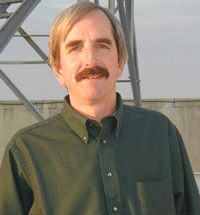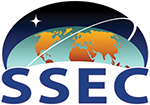Henry E. Revercomb Named SSEC Director
 Madison, WI, October 25, 2004—Henry E. Revercomb has been named director of the Space Science and Engineering Center (SSEC), University of Wisconsin–Madison. Dr. Revercomb has served as interim director since 1999, when Francis Bretherton retired from the position.
Madison, WI, October 25, 2004—Henry E. Revercomb has been named director of the Space Science and Engineering Center (SSEC), University of Wisconsin–Madison. Dr. Revercomb has served as interim director since 1999, when Francis Bretherton retired from the position.
In appointing Revercomb, Graduate School Dean Martin Cadwallader said, “I very much appreciate the role of SSEC on campus and am very proud that it is part of the Graduate School. I especially appreciate the way that you work as a team to fulfill the mission of SSEC.” Cadwallader himself was appointed Dean in 2001.
Revercomb has been an SSEC scientist since shortly after achieving a Ph.D. in 1972 from the University of Wisconsin–Madison. Trained as a physicist, he has specialized in the study of planetary atmospheres and in remote sensing using high-spectral resolution instruments. He has helped design several new spacecraft instruments and has led the design and fabrication of aircraft and ground-based instruments. He leads the center in developing products from the measurements taken by those instruments, such as the Atmospheric Emitted Radiance Interferometer and a Scanning-High-resolution Interferometer Sounder.
Revercomb has served on national and international science teams such as those devoted to Pioneer Venus and the Atmospheric InfraRed Sounder. He currently is on the team to develop a Geosynchronous Imaging Fourier Transform Spectrometer (GIFTS), a multi-agency effort offering a revolutionary advance in the observing capabilities from geosynchronous orbit. Revercomb leads SSEC’s role to provide the onboard calibration references, perform test data analyses, and contribute to sensor development with NASA and the Utah State University’s Space Dynamics Laboratory.
When Revercomb announced his acceptance to SSEC employees, he said that he believes “that this is a very exciting time for the Center, and I pledge to do my part, in partnership with all of you, to push back the frontiers.”
SSEC was founded in 1965 by Verner E. Suomi, a world-renowned meteorologist known as the “father of satellite meteorology”, and Robert Parent, a professor in the College of Engineering. Together, they developed instruments to measure Earth’s heat budget from the first weather satellites. The center is truly multidisciplinary; it houses the Cooperative Institute for Meteorological Satellite Studies, the Antarctic Meteorological Research Center, the SSEC Data Center and the Ice Coring and Drilling Service. Its researchers specialize in studying the earth from space, but that focus includes developing algorithms and other weather satellite products, data archiving, drilling deep holes in ice for scientific projects, instrument design and fabrication, and calibrating and validating new satellite and other remote sensing instruments primarily for NASA. The center is supported with grants and contracts, primarily from U.S. agencies including NASA, the National Oceanic and Atmospheric Administration, the Department of Energy and the National Science Foundation.
As interim director, Revercomb established a unique three-person management team to provide SSEC with executive direction in administration, science and technology. He also helped establish the SSEC council, an advisory body of scientists. He oversaw the first SSEC strategic plan. He annually presents the “State of the Center” to staff and interested associates.
Contact SSEC’s Public Information Officer at 608-263-3373 for more information.
For past features and columns, see SSEC’s News page.
